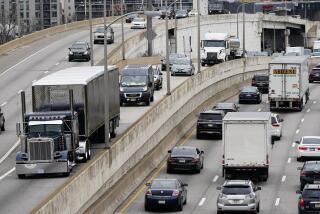Antilock Brakes: Are They Failing?
- Share via
When antilock brake systems were first introduced in the 1980s, they were widely hailed as an important advance in auto safety. Available first only on luxury cars, the antilock brakes are standard equipment today for the majority of vehicles.
But now, there is conflicting judgment about whether they have lived up to their promise.
Major insurance companies nationally have stopped offering discounts to motorists who own cars equipped with antilock brakes. Such discounts in the past have amounted to as much as 10% of an annual premium.
The discount was based on the notion that antilock brakes prevent accidents by helping drivers stop more quickly and preventing drivers from spinning out of control in an emergency stop.
But a study last year by the Insurance Institute for Highway Safety, funded by the insurance industry, concluded that cars equipped with antilock brakes had the same accident rate as the same model cars without antilock brake systems. The federal government has put off a decision on whether to make the systems mandatory.
In recent months, however, four major corporations that produce the bulk of antilock brakes systems have formed an “education alliance” to make sure motorists get a different message: that antilock brakes are worth their cost.
The companies--Robert Bosch, Delphi Chassis, ITT Automotive and Kelsey-Hayes--have hired Sam Memmolo to spread the gospel on antilock brakes. Memmolo hosts two radio talk shows about cars and is a master automotive technician. Memmolo dismisses the insurance industry study, saying that only a trained professional test driver can outperform an anti-lock brake system on either wet or dry pavement. Antilock systems, he says, help the vast majority of drivers keep control of their cars in fast stops.
But he admits that the brakes do have a big problem in consumer acceptance. A lot of drivers hate antilock systems, because they are not used to the pulsing sensation once the antilock system is engaged.
In an antilock system, a sensor at each wheel tells a computer whether that wheel has locked up and is now skidding on the pavement. If so, the computer directs a hydraulic controller to pulsate the braking at that wheel. Many drivers, however, have not learned to stop pumping the brake, thereby defeating the system, Memmolo said.
Here’s the advice the education alliance offers: Practice using your brakes by finding an empty parking lot and stopping hard to know how the brakes feel when the antilock system engages.
Read your owners manual so you know what to expect. Don’t forget that antilock brakes allow you to steer around obstacles while you are making a panic stop. And in a panic stop, keep a constant pressure on the brake pedal and don’t pump.
* Vartabedian cannot answer mail personally but will attempt to respond in this column to automotive questions of general interest. Do not telephone. Write to Your Wheels, Times Mirror Square, Los Angeles, CA 90053.







